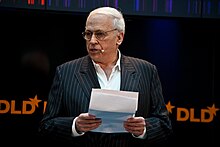约翰·布罗克曼
外观
| 约翰·布罗克曼 | |
|---|---|
 约翰·布罗克曼在2009年 | |
| 出生 | 1941 年2月16日 波士顿 |
| 职业 | 文学经纪人 |
约翰·布罗克曼(John Brockman,1941年2月16日—)是一位文学经纪人,以及专门研究科学文学的作家。他成立了前沿基金会,该组织聚集了大批科技领域的前沿思想家。
布罗克曼出生在马萨诸塞州波士顿一个贫穷的爱尔兰天主教徒聚居区,是波兰犹太裔移民。[1]他在C·P·斯诺“两种文化”的基础上,引入了“第三种文化”[2],该文化由“经验世界中的那些科学家和其他思想家”组成,“通过他们的工作及写作说明文,正在取代传统的知识分子,展现我们生活更深层的含义,重新定义我们是谁,以及我们是什么。”
在20年间,他领导了一个科学沙龙,每年向众多知名科学家提出一个问题,并以书籍形式发表他们的答案,[3]他决定在2018年象征性地关闭该沙龙。[4]
与杰弗里·爱泼斯坦的交往
[编辑]在2019年,有人说布罗克曼是金融家杰弗里·爱泼斯坦的“智囊”,这给布罗克曼的前沿基金会带来一笔固定费用。[7]爱泼斯坦以未成年人性交易的罪名被捕,并在等待审判时死亡。
布罗克曼在TED大会上举办的著名文学晚宴,使爱泼斯坦得以和科学家、创业者和其他技术亿万富翁交往。[8][9]
语录
[编辑]- “从某种意义上说,传统的美国知识分子越来越反动,而且常常骄傲地(且错误地)无视我们时代许多真正重要的知识成就。”[10]
- “纵观历史,只有极少数人为所有人进行了认真的思考。”
参考书目
[编辑]- By the Late John Brockman [在约翰·布罗克曼的后期]. 1969 (英语).
- 37. 1970 (英语).
- Afterwords: Explorations of the Mystical Limits of Contemporary Reality [后记:当代现实神秘极限的探索]. 1973 (英语).
- Doing Science: The Reality Club [做科学:现实俱乐部]. 1988 (英语).
- The Third Culture: Beyond the Scientific Revolution [第三种文化]. 1995 (英语).
- Digerati: Encounters with the Cyber Elite [迪格拉蒂:遭遇网络精英]. 1996 (英语).
- 哈珀·佩尔尼尔. 约翰·布罗克曼; 卡汀卡·马特森(Katinka Matson) , 编. How Things Are: A Science Tool-Kit for the Mind [情况如何:心灵的科学工具包]. 1996 (英语).
- The Next Fifty Years: Science in the First Half of the Twenty-First Century [未来50年]. 2002 (英语).
- The New Humanists: Science at the Edge [新人文主义者:前沿科学]. 2003 (英语).
- 约翰·布罗克曼 (编). Curious Minds : How a Child becomes a Scientist [好奇心:儿童如何成为科学家]. 纽约: 万神殿图书. 2004 (英语).
- What We Believe But Cannot Prove: Today's Leading Thinkers on Science in the Age of Certainty [我们相信但无法证明的事情:确定时代的当今前沿科学思想家]. 2006 (英语).
- Intelligent Thought: Science Versus the Intelligent Design Movement [智慧思想:科学与智慧设计运动]. 2006 (英语).
- What Is Your Dangerous Idea?: Today's Leading Thinkers on the Unthinkable [你危险的主意是什么?当今不可思议的领先思想家]. 2007 (英语).
- What Are You Optimistic About?: Today's Leading Thinkers on Why Things Are Good and Getting Better [你对什么持乐观态度?当今领先的思想家认为,为什么事情会变得越来越好]. 2007 (英语).
- What Have You Changed Your Mind About?: Today's Leading Minds Rethink Everything [你对什么改变了主意?当今领先的思想重新思考一切]. 2009 (英语).150位杰出的思想家讨论了他们最能说明问题的失误与反思,包括亚伦·艾达、布莱恩·伊诺、雷蒙德·库茨魏尔、艾琳·佩珀伯格、史迪芬·平克、丽莎·蓝道尔等。
- 约翰·布罗克曼; 帕特里克·贝特森; 奥利弗·莫顿; 史蒂芬·施耐德; 斯图尔特·布兰特; 布莱恩·伊诺; K·埃里克·德雷克斯勒. This Will Change Everything: Ideas That Will Shape the Future [这将改变一切:将要塑造未来的想法]. 等. 2009 (英语).
- Culture: Leading Scientists Explore Societies, Art, Power, and Technology [文化:领先科学家对社会、艺术、动力和技术的探索]. 2011 (英语).
- Is the Internet Changing the Way You Think?: The Net's Impact on Our Minds and Future [互联网是否正在改变您的思维方式?网络对我们的思想和未来的影响]. 2011 (英语).
- This Will Make You Smarter: New Scientific Concepts to Improve Your Thinking [这将使您变得更聪明:改善您思维的新科学概念]. 2012 (英语).
- This Explains Everything: Deep, Beautiful, and Elegant Theories of How the World Works [这解释了一切:关于世界如何运作的深刻、漂亮而优雅的理论]. 2013 (英语).
- What Should We Be Worried About?: The Hidden Threats Nobody Is Talking About [我们应该担心什么?无人谈论的隐藏威胁]. 2014 (英语).
- This Idea Must Die: Scientific Theories that are Blocking Progress [必须消灭这个想法:阻碍进步的科学理论]. 2015 (英语).
- What to Think About Machines That Think: Today's Leading Thinkers on the Age of Machine Intelligence [对思考机器的思考:当今机器智能时代的领先思想家]. 2015 (英语).
- Know This: Today's Most Interesting and Important Scientific Ideas, Discoveries, and Developments [知道这一点:当今最有趣和最重要的科学思想、科学发现和科学发展]. 2016 (英语).
- This Idea is Brilliant: Lost, Overlooked, and Underappreciated Scientific Concepts Everyone Should Know [这个想法很棒:每个人都应该知道的失去的、被忽视的和未被充分认识的科学概念]. 2017 (英语).
- 约翰·布罗克曼 (编). Possible Minds: Twenty-Five Ways of Looking at AI [可能的想法:看待AI的二十五种思路]. 2019 (英语).
参考文献
[编辑]- ^ John Brockman [约翰·布罗克曼]. 迷茫. 2012-07-08 [2020-02-26]. (原始内容存档于2020-09-20) (英语).
- ^ John, Warren St. Agent Provocateur [经纪人倡导者]. 连线. 1999-09-01 [2019-03-25]. ISSN 1059-1028. (原始内容存档于2020-10-28) (英语).
- ^ Marcus, Gary. What We Should Fear [我们应该怕什么]. 2013-01-15 [2019-03-25]. ISSN 0028-792X. (原始内容存档于2020-11-26) (英语).
- ^ The Last John Brockman Edge Question [约翰·布罗克曼最后一个前沿问题]. 连线. [2020-06-18]. (原始内容存档于2020-06-18) (英语).
- ^ Popova, Maria. 15 Years of Cutting-Edge Thinking on Understanding the Mind [15年关于理解思维的前沿思想]. 大西洋. 2011-09-14 [2019-03-25]. (原始内容存档于2021-03-08) (英语).
- ^ Naughton, John. John Brockman: the man who runs the world's smartest website [约翰·布罗克曼:经营着世界上最聪明网站的人]. 观察家报. 2012-01-08 [2019-03-25]. ISSN 0029-7712. (原始内容存档于2021-02-23) (英语).
- ^ Morozov, Evgeny. Jeffrey Epstein's Intellectual Enabler [杰弗里·爱泼斯坦]]的智囊]. 2019-08-22 [2019-10-13]. (原始内容存档于2021-05-01) (英语).
- ^ Morozov, Evgeny. The Epstein scandal at MIT shows the moral bankruptcy of techno-elites [MIT的爱泼斯坦丑闻表明技术精英的道德已破产]. 2019-09-07 [2019-10-13]. (原始内容存档于2021-04-26) (英语).
- ^ How Jeffrey Epstein Bankrolled An Exclusive Intellectual Boys Club And Reaped The Benefits [杰弗里·爱泼斯坦如何为一家独家的智力男孩俱乐部提供资金并获得收益]. BuzzFeed新闻. [2019-11-18]. (原始内容存档于2021-01-26) (英语).
- ^ Introduction [介绍]. www.edge.org. [2019-10-14]. (原始内容存档于2021-01-18) (英语).
扩展阅读
[编辑]- 斯拉沃热·齐泽克. Cultural Studies versus the "Third Culture" [文化研究与“第三种文化”]. The South Atlantic Quarterly. 2002, 101 (1): 19–32 [2020-06-18]. (原始内容存档于2020-11-12) (英语).
- Lee Worden. 伊恩·博阿; 詹菲里·斯通(Janferie Stone); 迈克尔·沃茨; 卡尔·温斯洛(Cal Winslow) , 编. Counterculture, Cyberculture, and the Third Culture: Reinventing Civilization, Then and Now [反文化、网络文化和第三种文化:时时重塑文明]. 奥克兰: West of Eden: Communes and Utopia in Northern California. 2012: 199–221 (英语).
- 帕斯卡尔·菲舍尔(Pascal Fischer). The "Third Culture Intellectuals" and Charles Darwin [“第三种文化知识分子”与查尔斯·达尔文] (PDF). Anglistentag Konstanz 2013: Proceedings (XXXV): 71–80. 2014 [2020-06-18]. (原始内容存档 (PDF)于2018-10-08) (英语).
- Max Stadler. Neurohistory Is Bunk?: The Not-So-Deep History of the Postclassical Mind [神经病史是废话吗?后古典思维不那么深的历史]. 伊希斯 (期刊). 2014, 105 (1): 133–144 [2020-06-18]. (原始内容存档于2021-05-08) (英语).
- 弗雷德·特纳; 克里斯汀·拉森(Christine Larson). Network Celebrity: Entrepreneurship and the New Public Intellectuals [网络名人:企业家精神与新公共知识分子] (PDF). 公共文化. 2015, 27 (1): 53–84 [2020-06-18]. (原始内容存档 (PDF)于2021-04-13) (英语).
外部链接
[编辑]- John Brockman [约翰·布罗克曼]. [2020-06-18]. (原始内容存档于2019-07-02) (英语).
- Brockman's taste for Science or how to entertain the smartest people [布罗克曼对科学的口味或如何招待最聪明的人]. [2020-06-18]. (原始内容存档于2006-05-20) (英语).
- Guardian Interview [卫报访谈]. 卫报. [2020-06-18]. (原始内容存档于2008-07-09) (英语).
- John Brockman [约翰·布罗克曼]. 赫芬顿邮报. [2020-06-18]. (原始内容存档于2020-06-21) (英语).
- So What Happens After Happenings? [那么发生后还会发生什么?]. 纽约时报. 1966-09-04 [2020-06-18]. (原始内容存档于2020-06-22) (英语).
- John Brockman: 40 years of "intermedia kinetic environments" [约翰·布罗克曼:40年的“中间动力学环境”]. (原始内容存档于2006-10-21) (英语).
- C-SPAN内的页面(英文)
